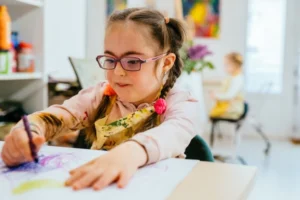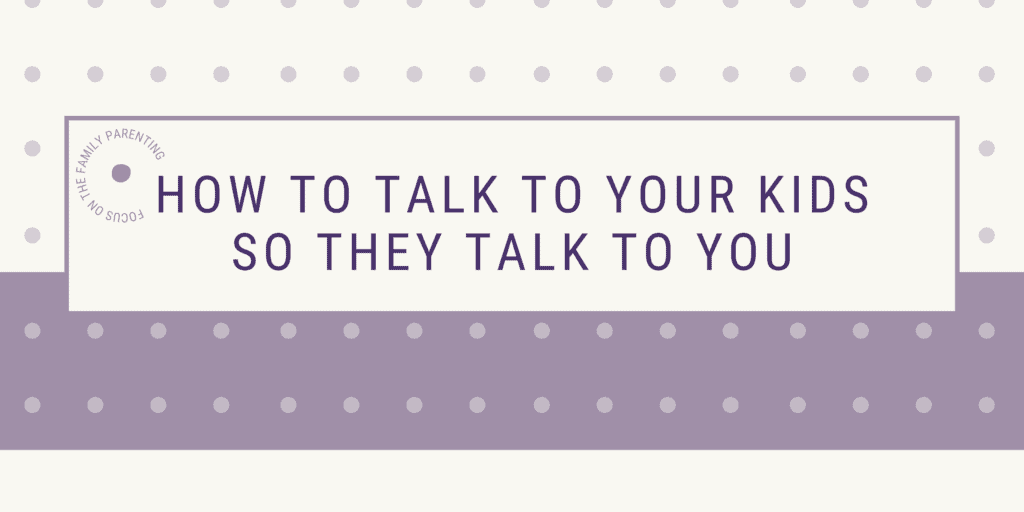
Find Hope in Raising a Child with Disabilities
Born with cerebral palsy, Dr. Tyler Sexton became a medical doctor who treats kids with special needs and encourages parents.

Knowing how to talk to your kids can feel overwhelming. To guide our kids toward independence, we need to walk alongside and support them.
I’ve come to believe that many of the top-down parenting methods I’ve tried over the years are inadequate in preparing my children for the world outside our home. Knowing how to talk to your kids can feel overwhelming. Simply telling my kids what to think or how to act does not prepare them to navigate the real world. It’s a place where the beliefs and behaviors of home are tested against the shifting sands of postmodern culture.
Instead, my husband and I have found that the more effective way to guide our kids toward independence is to walk alongside them on their journeys. We cultivate conversation and nurture the type of intelligence that helps our kids learn how to think about the world. Then, they will know how to interact with the people in it.
Jesus demonstrated the beauty of a conversational approach to life when He walked along the road with His disciples, asking questions, listening and telling stories. When we walk with our children, talking about life, we’re showing them how to love Jesus.
Walking with our children, talking about life — it all sounds ideal, but what does it mean? How can we engage our children amid the busyness of life? How do we cultivate meaningful conversation? Here are a few elements to help you talk to your kids and create a more conversational approach to parenting:
We need to become the kind of people that we want our children to emulate. Nothing makes us more approachable than a humble attitude. It lowers our children’s defenses and promotes open communication. Our willingness to be vulnerable, admitting when we’re wrong, will spill over into our kids’ lives, encouraging them to open their hearts to us.
My husband loves our kids, but sometimes he loses his temper. After one such occasion, he told our eldest daughter, “Hey, I blew it. I lost my temper. Will you please forgive me?” A day later, my daughter blew up in anger, slamming her door. We waited to see what would happen. She came to our room, her voice low. “I’m sorry. I lost my temper. Will you forgive me?” Her father’s words became her words because she had witnessed genuine repentance. This opened up a conversation about anger and appropriate ways to vent that anger.
Some parents worry that showing weakness to our kids undermines our authority. On the contrary, it invites them into our hearts and reassures them that, as fellow human beings, we can relate to their imperfections and shortcomings.
In this ever-shifting culture, kids long for authenticity — at home most of all. We can model authenticity by giving glimpses into our hearts, allowing our kids to see our joy and pain and asking them to pray alongside us.
When our family made the difficult decision to leave France, where we were planting a church, our daughter Sophie cried and railed against the decision. I didn’t have any words that would satisfy her anger. So I let her vent. But also I felt God prompting me to tell her one reason why we were headed back to the States. (We’d kept a lot of the church struggle quiet). I sat down next to her and shared one of my personal struggles with living in France. At the end, she cried. “I’m so sorry, Mom. I didn’t know.”
Giving my daughter an age-appropriate snapshot of my heart in that moment quelled her anger and moved her to express compassion. There is power in authenticity — the power to start a conversation, and the power to turn a conversation around.
The simple, elemental act of eating together as a family is one of the most important things you can do as a parent. It fosters lasting relationships with your kids, and can even help prevent poor choices later in life. The dinner table is a place where families can debrief milestones, victories, defeats, and the usual bumps and bruises of daily life. May our tables become a place where we worship God and love each other.
My friends Phil and Laina also use the dinner table as an opportunity for conversational parenting. One evening they discussed an invitation their daughter had received for a weekend with friends in another city, with no parental supervision.
“I knew what choice I wanted her to make,” Laina said, “but I chose to listen to her.” While they ate their meal, they engaged in a frank talk about sex and drugs and unsupervised weekends. By the end of the discussion, her daughter had decided not to go on the trip — and both of them had enjoyed a real bonding time.
“I’m so glad I held my tongue,” Laina said. “If I’d told her ‘no’ right at the beginning, I would have ended the conversation at that point.”
We long for our children to be able to create their own decision-making grid so they can establish healthy boundaries. But it often takes “processing” time and honest conversation for our kids to arrive at the right decision.
Asking questions is OK. That’s how kids explore their world, their beliefs, and the new and challenging ideas they encounter. Give your children the freedom to vent and wrestle. Don’t give pat answers. Love them through periods of questioning. By being open to your children’s questions, you gain the privilege of hearing what’s on their minds. Then, you can talk to your kids and begin to nudge them in the right direction.
Seek God’s wisdom for kid-shaped inquiries. We walk the parenting journey by His strength. We pursue our children’s hearts by His direction. And by His love, we love them well.
You live in the same house, speak the same language and have shared thousands of family memories over the years. But there are days when it’s a chore to get your children to open up and share what’s on their minds. We asked parents to share how they create channels of open communication with their children:
We began writing back and forth to one another, sometimes every couple of weeks, other times more often. In the years since, the pages have filled up with funny questions, inner fears, happy news and everyday “I love yous.” Our “talking journal” has allowed me to share in my daughter’s growing confidence. In an unexpected place, I’ve found the opportunity to talk with my kid as she processes the changes and challenges of life. —Jeanette Edgar